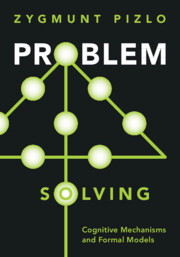Book contents
- Problem Solving
- Problem Solving
- Copyright page
- Dedication
- Contents
- Figures
- Tables
- Preface
- Chapter 1 Problem Solving
- Chapter 2 Animal Problem Solving
- Chapter 3 Modern Research on the Human Ability to Solve Problems that Have Large Search Spaces
- Chapter 4 The Exponential Pyramid Representation that Compensates for Exponentially Large Problem Spaces
- Chapter 5 Heuristic Function, Distance, and Direction in Solving Problems
- Chapter 6 Insight and Creative Thinking
- Chapter 7 Inference in Perception
- Chapter 8 Cognitive Inferences, Mental Representations
- Chapter 9 Theory of Mind
- Chapter 10 Solving Problems in Physics and Mathematics
- Chapter 11 Summary and Conclusions
- References
- Index
Chapter 1 - Problem Solving
Definition of the Main Concepts
Published online by Cambridge University Press: 23 June 2022
- Problem Solving
- Problem Solving
- Copyright page
- Dedication
- Contents
- Figures
- Tables
- Preface
- Chapter 1 Problem Solving
- Chapter 2 Animal Problem Solving
- Chapter 3 Modern Research on the Human Ability to Solve Problems that Have Large Search Spaces
- Chapter 4 The Exponential Pyramid Representation that Compensates for Exponentially Large Problem Spaces
- Chapter 5 Heuristic Function, Distance, and Direction in Solving Problems
- Chapter 6 Insight and Creative Thinking
- Chapter 7 Inference in Perception
- Chapter 8 Cognitive Inferences, Mental Representations
- Chapter 9 Theory of Mind
- Chapter 10 Solving Problems in Physics and Mathematics
- Chapter 11 Summary and Conclusions
- References
- Index
Summary
Problem solving is a goal-directed activity. As such, it depends critically on abstract, mental representations of a problem, including the identification of the goal that needs to be reached and the operations that allow the problem solver to navigate within the problem space. Because of this, mental representations of the physical, cognitive, and social environments take center stage when problem solving is discussed. The role of mental representations explains why the origins of research on problem solving are so closely related to the origins of the modern approach to perception initiated 100 years ago by the gestalt psychologists. The gestalt psychologists were particularly interested in insight problem solving, where the term “insight” provides an intuitive definition of such problems. We all know that Archimedes had an insight when he shouted out “Eureka” when he discovered the principle of buoyancy. Chapter 1 sets the stage for the remainder of the book, by promising to provide a new formalism that may be able to explain not only insight, but also many other research problems, including problems in mathematics and physics, as well as in scientific discovery. This ambitious plan should keep the students eager to see how it plays out, and by the end of Chapter 11 it should be clear why launching, 70 years ago, a new field called cognitive psychology, was called a scientific revolution.
- Type
- Chapter
- Information
- Problem SolvingCognitive Mechanisms and Formal Models, pp. 1 - 13Publisher: Cambridge University PressPrint publication year: 2022



